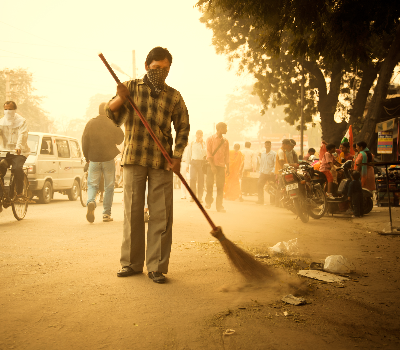
What I Love about India
October 08, 2018
If you want to live in a close-knit neighborhood, you need to get to know your neighbors.
Likewise, if you want to run an international business, you need to learn about the countries you do business with.
Not just their laws, not just their language, not just their currency exchange rate. You need to learn their customs, their culture, the very things that make them who they are. The more you understand them, the more you can respect who they are, what they do, and how they do it.
Take India, for example.

When I first went to India, I had no idea what to expect. I knew Hinduism was a prominent religion in the area, but as I explored Mumbai, I came to see it was far from the only observed faith. There were holy symbols of various faiths every which way I looked, with no shortage of churches and mosques and temples for people to worship at in their own way. Some shops had small shrines made of flowers set up by their doors to garner favor with their deities and bring good fortune, some others had signs saying “Pork Served Here” or “Beef Served Here” allowing those with religious dietary restrictions to easily identify where they could and could not eat.
The more I explored, the more I noticed how the various religions seemed to have their own districts, sections of the city geared more toward their faith and run by their rules. Each one went about their own business, but still cooperated with the others and let them do the same. Their differences distinguished them, but did not divide them, they were Inclusive while still being independent. Of course, what was accepted to one group wasn’t necessarily appreciated by another, a lesson I learned the hard way when I noticed how many people were staring at my exposed shoulders during a trip to the market. I hadn’t received this sort of animosity while at a different market the day before, but I wasn’t in that market any longer, and as such, wasn’t playing by their rules anymore. I’ve always considered myself a conservative dresser, but this trip reminded me that the definition of “conservative” can be vastly different depending on who you ask. Ever since that trip, I’ve made it a point to always bring a large jacket with me wherever I go, so I’ll always be ready to adjust my appearance to meet local culture
Speaking of culture, I had made friends with the administrator at the hotel I was staying at, and she was kind enough to send me on a cultural experience I will never forget.
I didn’t initially understand her recommendation to visit the local washing area, but I had time and she seemed quite excited about it, so my family and I thought we’d give it a go. Thank goodness we did, or we never would’ve gotten to see people celebrating Holi, the festival of colors! People all around us were dancing and running through the streets, jumping on the rooftops and flinging colorful powder around with glee. I’ll admit, I was a little surprised by the lack of regulations concerning celebratory fires people kept setting, and the police presence keeping watch for drunken violence was a tad concerning, but the sheer beauty of the festivities was overpowering. I couldn’t help but share in the joy that I was witnessing around me, though I’m afraid I did not take part, as I didn’t want to have to wash all those colors out of my clothes.
But that brings me back to the point of the story, the washing.
When we finally arrived at the washing area, I was surprised to find out that the local hospitals had their linens washed at the same place most civilians came to wash their clothes. As I came to learn, the hospitals did not have their own washing machines, paying those of the lower caste to do it for them was simply a cheaper investment. It was quite a difference from the sanitation policies I had become accustomed to in America, and it was only the beginning. A trip through the fish market showed me shop keepers living and sleeping at their stands, butchering the fish right then and there for customers while eating unsold inventory themselves. They even fed leftovers to their pet dogs and cats, also living in the same general area where food was being bought and sold.
It was a shock to me, but it was just the way the world worked to the locals, and I needed to keep that in mind if I wanted to do business with them. In the end, working with a country you don’t understand is like playing a game you don’t know the rules to: You’re not going to win, and the other players aren’t going to like playing with you.
Of course, there are always the players who take advantage of novice amateurs. They’re well aware you don’t know the rules, and will use your ignorance against you. This is something else I have experience with, but we’ll save that story for my next blog.

Sweet Tips from Ally
-Understand what foreign businesses consider acceptable dress so you’ll make a good first impression.
-Recognize and plan around local holidays so you don’t offend or impeded their worship.
-Learn how specific business cultures conduct themselves so you won’t be caught off guard.
Likewise, if you want to run an international business, you need to learn about the countries you do business with.
Not just their laws, not just their language, not just their currency exchange rate. You need to learn their customs, their culture, the very things that make them who they are. The more you understand them, the more you can respect who they are, what they do, and how they do it.
Take India, for example.

When I first went to India, I had no idea what to expect. I knew Hinduism was a prominent religion in the area, but as I explored Mumbai, I came to see it was far from the only observed faith. There were holy symbols of various faiths every which way I looked, with no shortage of churches and mosques and temples for people to worship at in their own way. Some shops had small shrines made of flowers set up by their doors to garner favor with their deities and bring good fortune, some others had signs saying “Pork Served Here” or “Beef Served Here” allowing those with religious dietary restrictions to easily identify where they could and could not eat.
The more I explored, the more I noticed how the various religions seemed to have their own districts, sections of the city geared more toward their faith and run by their rules. Each one went about their own business, but still cooperated with the others and let them do the same. Their differences distinguished them, but did not divide them, they were Inclusive while still being independent. Of course, what was accepted to one group wasn’t necessarily appreciated by another, a lesson I learned the hard way when I noticed how many people were staring at my exposed shoulders during a trip to the market. I hadn’t received this sort of animosity while at a different market the day before, but I wasn’t in that market any longer, and as such, wasn’t playing by their rules anymore. I’ve always considered myself a conservative dresser, but this trip reminded me that the definition of “conservative” can be vastly different depending on who you ask. Ever since that trip, I’ve made it a point to always bring a large jacket with me wherever I go, so I’ll always be ready to adjust my appearance to meet local culture
Speaking of culture, I had made friends with the administrator at the hotel I was staying at, and she was kind enough to send me on a cultural experience I will never forget.
I didn’t initially understand her recommendation to visit the local washing area, but I had time and she seemed quite excited about it, so my family and I thought we’d give it a go. Thank goodness we did, or we never would’ve gotten to see people celebrating Holi, the festival of colors! People all around us were dancing and running through the streets, jumping on the rooftops and flinging colorful powder around with glee. I’ll admit, I was a little surprised by the lack of regulations concerning celebratory fires people kept setting, and the police presence keeping watch for drunken violence was a tad concerning, but the sheer beauty of the festivities was overpowering. I couldn’t help but share in the joy that I was witnessing around me, though I’m afraid I did not take part, as I didn’t want to have to wash all those colors out of my clothes.
But that brings me back to the point of the story, the washing.
When we finally arrived at the washing area, I was surprised to find out that the local hospitals had their linens washed at the same place most civilians came to wash their clothes. As I came to learn, the hospitals did not have their own washing machines, paying those of the lower caste to do it for them was simply a cheaper investment. It was quite a difference from the sanitation policies I had become accustomed to in America, and it was only the beginning. A trip through the fish market showed me shop keepers living and sleeping at their stands, butchering the fish right then and there for customers while eating unsold inventory themselves. They even fed leftovers to their pet dogs and cats, also living in the same general area where food was being bought and sold.
It was a shock to me, but it was just the way the world worked to the locals, and I needed to keep that in mind if I wanted to do business with them. In the end, working with a country you don’t understand is like playing a game you don’t know the rules to: You’re not going to win, and the other players aren’t going to like playing with you.
Of course, there are always the players who take advantage of novice amateurs. They’re well aware you don’t know the rules, and will use your ignorance against you. This is something else I have experience with, but we’ll save that story for my next blog.

Sweet Tips from Ally
-Understand what foreign businesses consider acceptable dress so you’ll make a good first impression.
-Recognize and plan around local holidays so you don’t offend or impeded their worship.
-Learn how specific business cultures conduct themselves so you won’t be caught off guard.

Would you like a
coffee with ally?
With a fresh brew and some pastries, sit down with Ally
and get tips on how to grow your business!
Start a conversation
and get tips on how to grow your business!
















start a conversation